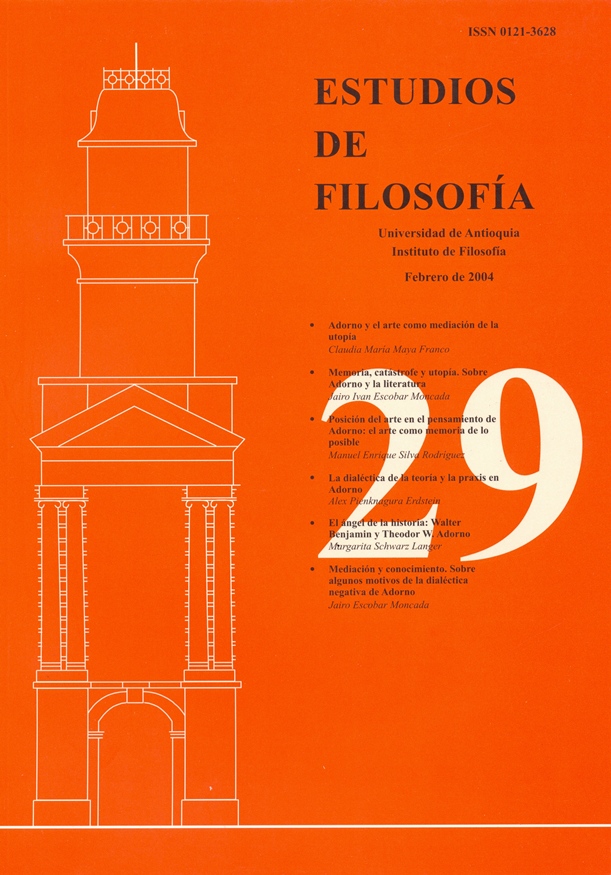Adorno and art as mediation of utopia
DOI:
https://doi.org/10.17533/udea.ef.12938Keywords:
Aesthetics, society, autonomy, art, utopia, criticism, mimesisAbstract
Adomo's Aesthetic Theory is one of the most accomplished attempts to take modern art to its concept. Its starting point is the recognition of the social nature of the aesthetic fact as well as the resistance of modem an with respect to any kind of social goal. This double nature has social fact and autonomy constitutes art as a critical element within the social so the endeavor of conceptualisation takees on social criticism. The nature of aesthetic criticism makes art mediate between the social and utopia.
Downloads
References
ADORNO, Theodor W. Teoría estética. Madrid: Taurus. 1989.
ARENDT, Hannah. Franz Kafka, revalorado, en: KAFKA, Franz. Obras completas I. Novelas: El desaparecido (América). El proceso. El castillo. Traducción de Miguel Saénz. Galaxia Gutenberg/Círculo de Lectores, 1999.
GUTIERREZ GIRARDOT, Rafael. Modernismo. Supuestos históricos y culturales. México: Fondo de Cultura Económica. 1987.
HEGEL, G. W. F. Lecciones de estética. Barcelona: Península. 1991. vol. 1.
HORKHEIMER, Max.; ADORNO. Theodor. W. Sociológica. Madrid: Taurus. 1979.
_____________. Dialéctica de la ilustración. Madrid: Trotta, 1994.
WELLMER, Albrecht. Sobre la dialéctica de modernidad y postmodernidad. La critica de la razón después de Adorno. España: Visor, 1993.
Downloads
Published
How to Cite
Issue
Section
Categories
License
Copyright (c) 2004 Claudia María Maya Franco

This work is licensed under a Creative Commons Attribution-NonCommercial-ShareAlike 4.0 International License.
Authors who publish with this journal agree to the following terms:
1. The Author retains copyright in the Work, where the term "Work" shall include all digital objects that may result in subsequent electronic publication or distribution.
2. Upon acceptance of the Work, the author shall grant to the Publisher the right of first publication of the Work.
3. The Author shall grant to the Publisher a nonexclusive perpetual right and license to publish, archive, and make accessible the Work in whole or in part in all forms of media now or hereafter known under a Creative Commons Attribution-NoCommercia-ShareAlike (CC BY-NC-SA 4.0), or its equivalent, which, for the avoidance of doubt, allows others to copy, distribute, and transmit the Work under the following conditions: (a) Attribution: Other users must attribute the Work in the manner specified by the author as indicated on the journal Web site;(b) Noncommercial: Other users (including Publisher) may not use this Work for commercial purposes;
4. The Author is able to enter into separate, additional contractual arrangements for the nonexclusive distribution of the journal's published version of the Work (e.g., post it to an institutional repository or publish it in a book), as long as there is provided in the document an acknowledgement of its initial publication in this journal;
5. Authors are permitted, and Estudios de Filosofía promotes, to post online the preprint manuscript of the Work in institutional repositories or on their Websites prior to and during the submission process, as it can lead to productive exchanges, as well as earlier and greater citation of published work (see The Effect of Open Access). Any such posting made before acceptance and publication of the Work is expected be updated upon publication to include a reference to the Estudios de Filosofía's assigned URL to the Article and its final published version in Estudios de Filosofía.















